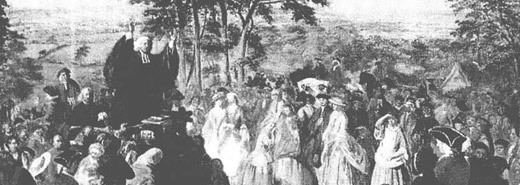
This morning I’ve got Whitefield and Wesley on my mind. This morning I was thinking about John Wesley’s infamous and divisive sermon called Free Grace and went looking for what I had written on it in the past. This was the sermon that began a significant rift between Whitefield and the Wesleys, for not only did it set them at theological odds, but it also betrayed Whitefield’s trust in Wesley. Though the men continued to love one other, this sermon was a very significant force in the eventual separation between them. Wesley’s sermon, though still highly regarded by some, is hardly a fair, biblical or thorough treatment of the subject of free will, free grace or predestination. It relies far more on shock, bold claims, and outrageous exaggerations than it does on Scripture.
One of Wesley’s biographers, Julia Wedgwood, was harsh but fair when considering this sermon. She says,
There is in it something of that provoking glibness with which young or half-cultivated people settle in a few sentences questions that have exercised the deepest minds ever since the dawn of speculation. Wesley was neither young nor uncultivated, but that incapacity for seeing difficulties which is characteristic of an early stage of culture, was a part of his nature.
In this sermon he does not once confront the difficulties which must be accepted by any one who, from his point of view, should reject predestination. He does not see that, if the design of Christ was to save all and the result is that He only saves some, His work was a failure. Indeed, it is evident on reading this sermon, that, of all the deep works which had been written on the subject, Wesley had never read one; he had taken it for granted that the opinion he set himself to confute could be held by none but fools, and his confutation was condemned to that futility by which all such arrogance is punished.
No doubt the sermon produced an effect, for it was preached with all his heart; but that effect, we may confidently assert, was not to shake one mind which had laid hold of the doctrine of election. But if this sermon is futile as an argument, the forcible rhetoric displayed in it goes some way to illustrate his influence as a preacher.
Wedgwood concludes that much of Wesley’s success should be attributed to his ability as a preacher rather than with the words he spoke. The way he spoke was often as important, or even more important, than the content of what he spoke. What he preached with all his heart was able to sway his listeners simply because of the force of his rhetoric. This stands as a warning to us that it is easy to be overpowered by a method in such a way that we lose sight of the message being conveyed. Haven’t we all found ourselves falling into this trap at one time or another?
I was drawn to the words “that provoking glibness with which young or half-cultivated people settle in a few sentences questions that have exercised the deepest minds ever since the dawn of speculation.” Since I began this web site I have often written about difficult subjects and have often been taken aback when, just hours after posting an article about free will or some other difficult topic, I get an email from a sixteen year old who really thinks he can solve two thousand years of disagreement with a single sentence. This is the glibness, the irrational confidence, that can come with youth. Of course I am not immune to this myself and this is especially so when it comes to doctrines where I have great confidence that what I believe is the biblical position. I find it bewlidering that a Christian could believe anything but the doctrines of grace. It makes no sense to me that Christians, who truly love the Lord, could deny some of His greatest characteristics and how they could, as Wesley did, say that if predestination is true, God is no better than the devil. The more I am convicted by Scripture the more I find that I cannot imagine how people can deny such important doctrines. But I know that this is also true for people who disagree with me.
I think this is one of the best arguments for reading church history and reading biographies of Christians of days past. When I read church history and read the biographies of great Christians I see how common it is for godly men to disagree on issues even as fundamental as predestination and free will. Having a perspective on these issues that is two thousand years wide is much more valuable than having a perspective that spans only a few years or a handful of books. Even when dealing with difficult issues, it is important that we display the kind of humility that Wesley forsook. We need to understand that greater Christians than ourselves wrestled with these issues and often came to differing conclusions, whether the topic is the doctrines of grace, the end times, the meaning and mode of baptism, and so on. We are so blinded by our sin and our corrupted powers of reasoning that we will never know the truth exhaustively. Studying the history of the church helps keep us grounded, showing that there is bound to be disagreement and hopefully showing how we can work together for the sake of Christ and his gospel despite such disagreement.










